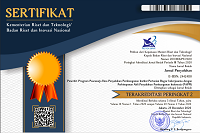Strategy to Develop Traditional Fishery Business in Implementing the Principle of Sustainable Business
Abstract
The importance of sustainable development in fishery has been clearly seen in Indonesia through the existence of Law No.31 Year 2004 on Fishery. It is stated that fishery development is aimed to create job opportunities, fish farmer and fisherman welfare, and to maintain the sustainability of fishery resource and environment. Therefore, all aspects of fishery development activities, including traditional fish processing business should be based on the view of sustainable development. According to the description, the objectives of this study are: (1) to analyze traditional fish processing business; (2) to determine factors influencing one another in sustainable fishery business; and (3) to formulate strategy to improve the competence of traditional processing workers. This research was conducted through the method of survey in three regencies in Lampung Province; namely Tanggamus Regency, Pringsewu Regency, and East Lampung Regency, with a number of samples amounting to 235 respondents; later on the number of samples in each group was determined using the technique of proportional random sampling. Assessment towards the fish processing workers in sustainable traditional processing business generated quite good result since the processing workers were confident that the business developed well and sustainably. The competence of processing workers is influenced by non-formal education and entrepreneurial characteristics. The competence and implementation of extension has a direct influence, while individual characteristics of processing workers indirectly influence the sustainable traditional fishery business. Strategy to improve the competence of sustainable traditional fishery business is done by: (a) strengthening the competence of traditional fish processing workers particularly in technical and managerial aspects through the development of entrepreneurial characteristics; and (b) strengthening the extension intensity through extension method and media to create changes in behavior in running a sustainable traditional fishery business (economy, social, and environment).
Keywords: Sustainable, fishery, traditional processing workers, strategy
Downloads
References
Amanah S. 2005. Pengembangan masyarakat pesisir berdasarkan kearifan lokal di pesisir Kabupaten Buleleng di Provinsi Bali. [Disertasi]. Bogor (ID): Institut Pertanian Bogor.
_________ 2007. Makna Penyuluhan dan Transformasi Perilaku Manusia. Jurnal Penyuluhan. 3(1): 63-66.
Amanah S. 2005. Pengembangan masyarakat pesisir berdasarkan kearifan lokal di pesisir Kabupaten Buleleng di Provinsi Bali. [Disertasi]. Bogor (ID): Institut Pertanian Bogor.
Barth M, Godemann J, Riekmann M, Stollenberg O. 2017. Developing key competencies for sustainable development in higher education. International of Sustainability in Higher Education. 8(4); 416-430.
Ciptanto S. 2010. TOP 10 Ikan Air Tawar Panduan Lengkap Pembesaran secara Organik di Kolam Air, Kolam Terpal, Karamba, dan Jala Apung.Lily Publisher. Yogyakarta.
Devi KPT Suamba IK. Artini NWP. 2016. Analisis pengendalian mutu pada pengolahan ikan palagis beku. Jurnal Agribisnis dan Agrowisata. 5(1):1-11.
Dinas Kelautan dan Perikanan Provinsi Lampung. 2016. Data Statistik P2HP Provinsi Lampung.
Fatchiya A. 2010. Tingkat kapasitas pembudidaya ikan dalam mengelola usaha akuakultur secara berkelanjutan. Jurnal Penyuluhan. 6(1): 67-75.
Grudzinskiy AO. Zakharova L. Bureeva N. Leonova I. Mahalin A. 2015. Personal Competences of Succession Pool for Management Positions within University Competitiveness Increase: Meaning and Identifications. Procedia Social and Behavior Science. 214(2015); 586-597.
Helmi Z, Sumardjo, Purwaningsih N, Tjitropranoto P. 2013. Hubungan kompetensi penyuluh dengan karakteristik pribadi, persepsi penyuluh terhadap dukungan kelembagaan dan persepsi penyuluh terhadap sifat inovasi cyber extension. Jurnal Agro Ekonomi. 31(1): 1-18
Hladik J, Jadama L M. 2015. Multicultural Competence of Helping Profession Students; Cross Cultural Comparison Between Europe and Africa. Procedia - Social and Behavioral Sciences. 214 (2015); 586 – 595.
Mahadalle A, Kaplan B. 2017. Rntrepreneurial characteristic and competencies as determinat of corporate performance: a study of small enterpreneur. International Journal of Research GRATHAALAYAH. 5(5); 234-254. doi: org/10.5281/zenodo.583915.
Markum ME. 1998. Sifat sumber daya manusia Indonesia penunjang pembangunan. Disertasi Doktor. Program Pascasarjana, Fakultas Psikologi, Universitas Lampung.
Riyadi PH, Bambang AN, Agustini AW. 2015. Analisis kebijakan keamanan pangan produk hasil hasil perikanan di Pantura Jawa Tengah dan DIY.
Sapar, Jahi A, Asngari PS. Saleh A, Putupurnaba IG. 2012. Penyuluh Pertanian dan Dampaknya Pada Kompetensi Petani Kakao di Empat Wilayah Sulawesi Selatan. Jurnal Penyuluhan. 8(1);29-41.
Smith W, Chimucheka T. 2014. Entrepreneurship, economic growth and entrepreneurship theories. Mediterramean Journal of Social Science. 5(14); 160-168. doi: 10.5901/mjss.2014.v5n14p160.
Sukardi IS. 1991. Intervensi terencana faktor-faktor lingkungan terhadap pembentukkan sifat-sifat antrepreneur (Entrepreneur Traits). Disertasi Doktor. Program Pascasarjana, Fakultas Psikologi, Universitas Indonesia.
Suprayitno A. 2011. Model peningkatan partisipasi petani sekitar hutan dalam mengelola hutan kemiri rakyat: Kasus Pengelolaan Hutan Kemiri Kawasan Pegunungan Bulusaruang. Kabupaten Maros Sulawesi Selatan. [disertasi]. Bogor (ID): Institut Pertanian Bogor.
Spencer LM, Spencer SM. 1993. Competence At Work; Model for Superior Performance. New York (US): John Miley & Sons. Inc.
Tudor LT. 2017. Formal non formal in formal education. Procedia Social and Behavioral Science. 76(2013); 821-826. doi : 10.1016/J.sbspro.2013.04.213.
Yuliana E. Suhardi DA. Susilo A. 2011. Timngkat penggunaan bahan kimia berbahaya pada pengolahan ikan asin. Kasus di Muara Angke dan Cilincing; Jakarta. Jurnal Pengolahan Hasil Perikanan Indonesia. XIV (1): 14-21.
Authors who publish with this journal agree to the following terms:
- Authors retain copyright and grant the journal right of first publication with the work simultaneously licensed under a

This work is licensed under a Creative Commons Attribution 4.0 International License that allows others to share the work with an acknowledgement of the work's authorship and initial publication in this journal. - Authors are able to enter into separate, additional contractual arrangements for the non-exclusive distribution of the journal's published version of the work (e.g., post it to an institutional repository or publish it in a book), with an acknowledgement of its initial publication in this journal.
- Authors are permitted and encouraged to post their work online (e.g., in institutional repositories or on their website) prior to and during the submission process, as it can lead to productive exchanges, as well as earlier and greater citation of published work (See The Effect of Open Access).















